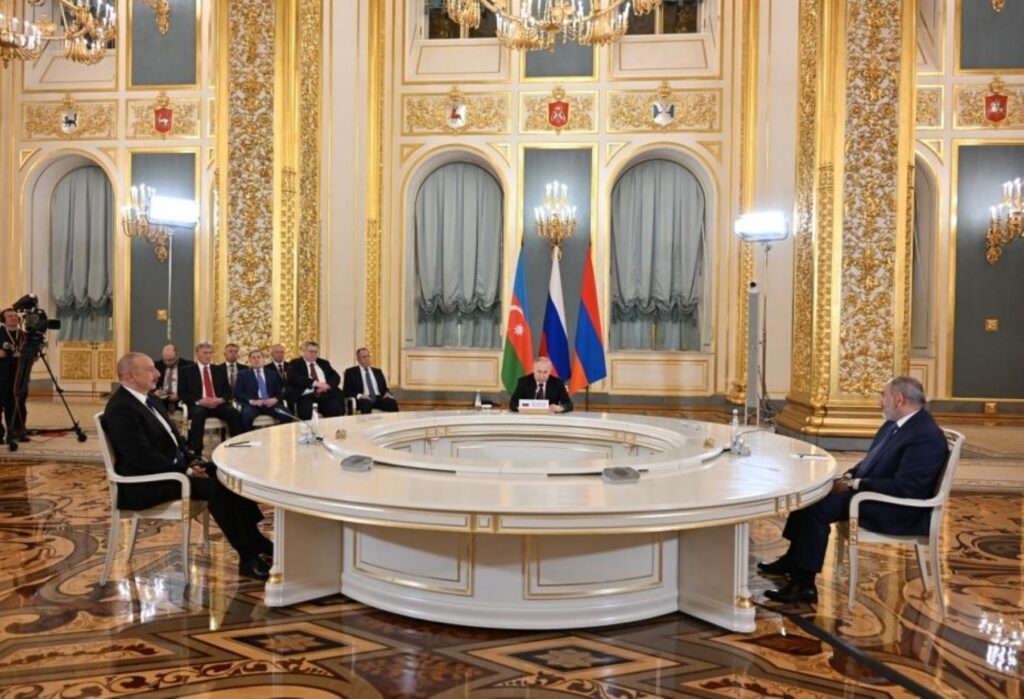A meeting between Armenian Prime Minister Nikol Pashinyan and Azerbaijani President Ilham Aliyev in Moscow ended late on Thursday night with no new agreements signed, following a heated discussion between the two leaders at a meeting of the Supreme Eurasian Economic Council.
Pashinyan and Aliyev took part in a trilateral meeting mediated by Russian President Vladimir Putin, as part of the 30th Supreme Eurasian Economic Council summit, following both individual meetings between the Russian president and each of the leaders, and a ‘broad-format’ meeting also attended by the leaders of Belarus, Kazakhstan, Kyrgyzstan, Uzbekistan, and Tajikistan.
During the opening remarks of the broad-format meeting, Pashinyan and Aliyev exchanged pointed disagreements regarding Aliyev’s mention of the ‘Zangezur corridor’, a route proposed by Baku to connect Azerbaijan to its western exclave of Nakhchivan through Armenia.
After interrupting the Russian president, Pashinyan accused Aliyev of using ‘an expression that in recent years has served as a title for putting forward territorial claims against Armenia’, in response to which the Azerbaijani president claimed that corridor was ‘an international term’ and so could not constitute an encroachment on someone’s territory.
Aliyev also asserted that the Zangezur corridor was supported by Russia, with Pashinyan responding that this was ‘the first time’ he had heard the latter claim. Aliyev and Pashinyan went on to disagree regarding the Lachin Corridor and the blockade of Nagorno-Karabakh, before the discussion was called to a halt by the Russian president.
Following a later meeting between Aliyev, Pashinyan, and Putin, which took place behind closed doors, a meeting between the three countries’ deputy prime ministers was agreed for the following week, but no new agreements were signed, despite Russian media predictions to the contrary. The leaders reportedly discussed opening transport and economic links between Armenia and Azerbaijan.
Another meeting between Pashinyan and Aliyev, this time mediated by the German chancellor, French president, and EU Council president, is scheduled to take place on 1 June in Chișinău, Moldova.
Maintaining momentum
This is the second meeting between Aliyev and Pashinyan to take place this month, and comes not long after Pashinyan stirred controversy by stating that Azerbaijan’s territory included Nagorno-Karabakh.
On 14 May, the President of Azerbaijan and the Prime Minister of Armenia met in Brussels at a meeting mediated by President of the Council of the European Union Charles Michel.
At that meeting, the two countries’ leaders discussed border delimitation, reopening transport and economic links, and releasing two Azerbaijani soldiers captured in Armenia.
[Read on OC Media: Pashinyan and Aliyev make ‘clear progress’ in Brussels talks]
On Monday, Pashinyan stated at a press conference that while the region’s ‘military-political situation’ remained tense, a peace treaty and establishment of relations with Azerbaijan was being ‘intensively negotiated’.
‘We hope to reach an agreement on the text and sign it as soon as possible’, said the prime minister.
He went on to state that, in terms of mutual recognition of territorial integrity, ‘the 86,600 sq km of Azerbaijan's territory includes Nagorno-Karabakh’, while stressing the importance of dialogue between Azerbaijan and Nagorno-Karabakh to ensure the security of the region’s Armenians.
Pashinyan’s statement was sharply criticised by both Armenian politicians and high-ranking officials of Nagorno-Karabakh.
Both Nagorno-Karabakh’s parliament and its president swiftly condemned Pashinyan’s comments, stating that Pashinyan was ignoring Nagorno-Karabakh’s sovereignty and the ‘right of the people of Artsakh to self-determination’.
‘Close to agreement’
Aliyev’s and Pashinyan’s meetings in Moscow came shortly after their foreign ministers met in Russia; Armenian Foreign Minister Ararat Mirzoyan, Azerbaijani Foreign Minister Jeyhun Bayramov, and their Russian counterpart Sergey Lavrov met in Moscow on 19 May.
At the time, Lavrov stated that Yerevan and Baku were close to reaching a final agreement on opening transport links between the two countries, while not disclosing any details regarding the nature of the agreement and their positions.
Azerbaijani press reported on 26 May that Azerbaijan’s ambassador to France, Leyla Abdullayev, stated that a peace agreement ‘could be signed’ at the meeting between Aliyev and Pashinyan set to take place in Chișinău next week and expressed her hope that this would take place.
Mirzoyan and Bayramov also met on 5 May in a meeting mediated by US Secretary of State Antony Blinken in Washington. Blinken stated that a peace agreement between Armenia and Azerbaijan was ‘within reach’ after four days of negotiations.
For ease of reading, we choose not to use qualifiers such as ‘de facto’, ‘unrecognised’, or ‘partially recognised’ when discussing institutions or political positions within Abkhazia, Nagorno-Karabakh, and South Ossetia. This does not imply a position on their status.




 26 May 2023
26 May 2023



